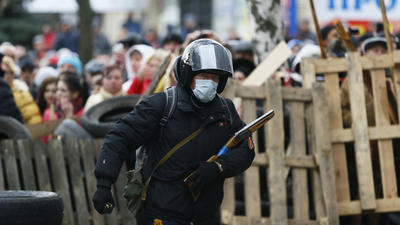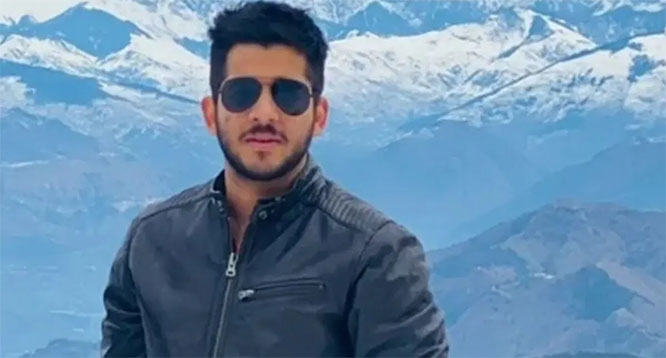
Pro-Russian activists carrying automatic weapons seized government buildings in Slaviansk, a town about 150 km (90 miles) from the Russian border, and set up barricades on the outskirts of the city.
In Kramatorsk, some 80km (50 miles) to the north, gunmen seized the police station after a shootout with police, a Reuters witness said.
Government buildings in several other towns in the Donetsk and Luhansk regions were attacked in what Washington said were moves reminiscent of the events that preceded Russia's annexation of Ukraine's Crimean peninsula.
"We are very concerned by the concerted campaign we see under way in eastern Ukraine today by pro-Russian separatists, apparently with support from Russia, who are inciting violence and sabotage and seeking to undermine and destabilize the Ukrainian state," said Laura Lucas Magnuson, spokeswoman for the White House National Security Council.
"We saw similar so-called protest activities in Crimea before Russia's purported annexation," she said in a statement, adding: "We call on President (Vladimir) Putin and his government to cease all efforts to destabilize Ukraine, and we caution against further military intervention."
US vice president Joe Biden will travel to Kiev on April 22 to show support for Ukraine's government, the White House said on Saturday. He will be the most senior US official to visit the country since the crisis began there.
The West accuses Russia of destabilizing the region as a pretext to potentially sending in troops to protect the local Russian-speaking population, as it did in Crimea. NATO says Russian armed forces are massing on Ukraine's eastern border, while Moscow says they are on normal maneuvers.
Any escalation would increase the risk of a "gas war" that could disrupt energy supplies across Europe.
'Display of aggression'
Ukrainian interior minister Arsen Avakov called the attacks in the east "a display of external aggression from Russia."
"Units of the interior and defense ministries are implementing an operational response plan," he added.
Russian Foreign Minister Sergei Lavrov said Ukraine was "demonstrating its inability to take responsibility for the fate of the country" and warned that any use of force against Russian speakers "would undermine the potential for cooperation" including talks due to be held on Thursday among Russia, Ukraine, the United States and the European Union.
In a phone call with Lavrov, US Secretary of State John Kerry "made clear that if Russia did not take steps to de-escalate in eastern Ukraine and move its troops back from Ukraine's border, there would be additional consequences," a senior State Department official said.
The official did not state what the consequences would be.
The United States and EU have slapped sanctions on Russian officials and leading business figures in response to Moscow's annexation of Crimea. The Canadian government said on Saturday it imposed sanctions on two more individuals and a Crimean oil and gas company in response to the crisis.
Moscow has scoffed at the Western measures.
In Slaviansk, at least 20 men with pistols and automatic weapons took over the police station and a security service headquarters before spreading out through the city.
Officials said the militants, wearing mismatched combat fatigues, balaclavas and bulletproof vests, seized hundreds of pistols from weapons stores in the buildings.
The city's mayor said she supported the protesters, and more than a thousand people gathered in front of the police station, chanting: "Moscow, Crimea, Russia!".
They cheered as the Ukrainian flag was replaced with the blue, black and red of the self-declared Donetsk Republic.
"We want to join Russia. We would be very grateful if Russia helps us," said a gunman who gave his name as Alexander, wearing camouflage fatigues and a black balaclava mask.
"We will stand until victory. Honestly, it's not scary for me to die for freedom."
On a road into Slaviansk, men with automatic rifles set up a roadblock and checked vehicles entering the city.
It was unclear if local law enforcement agencies were taking orders from Kiev any more after the regional police chief quit.
Kostyantyn Pozhydayev came out to speak to pro-Russian protesters at his offices in the regional capital, Donetsk, and told them he was stepping down "to avoid bloodshed".
Ukrainian commentator Sergei Leshchenko said the burst of activity by pro-Russian groups was an attempt by the Kremlin to secure a strong negotiating position before the international talks about Ukraine in Geneva next week.
Russia is expected to argue at the talks for a revamp of Ukraine's constitution to give a large degree of autonomy to eastern Ukraine, something Kiev and its Western backers reject.
"Russia will come to the talks with the position that 'Donetsk and several neighboring regions are already ours - now let's talk about federalization'," said Leshchenko, a commentator with the Ukrainska Pravda newspaper.
'Gas war'
With the crisis in Ukraine still unresolved, the gas dispute threatens to affect millions of people across Europe.
A large proportion of the natural gas that EU states buy from Russia is pumped via Ukrainian territory, so if Russia makes good on a threat to cut off Ukraine for non-payment of its bills, customers farther west will have supplies disrupted.
Russia is demanding Kiev pay a much higher price for its gas, and settle unpaid bills. Russian state-owned gas giant Gazprom and its Ukrainian counterpart, Naftogaz, are in talks, but the chances of an agreement are slim.
"I would say we are coming nearer to a solution of the situation, but one in the direction that is bad for Ukraine," Ukrainian energy minister Yuri Prodan said in an interview with the German newspaper Boersenzeitung.
"We are probably steering towards Russia turning off its gas provision," he was quoted as saying.
That raised the specter of a repeat of past "gas wars", when Ukraine's gas was cut off with a knock-on effect on supplies to EU states.
The scope for compromise narrowed after the Naftogaz chief executive told a Ukrainian newspaper that Kiev was suspending payments to Gazprom pending a conclusion of talks on a new deal.
Ukraine has de facto stopped payments already because it failed to make an installment of over $500 million due this month to Gazprom.
Moscow says it does not want to turn off Ukraine's gas if it can be avoided, and that it will honor all commitments to supply its EU customers.







Comments
Add new comment